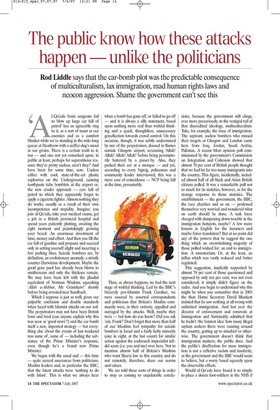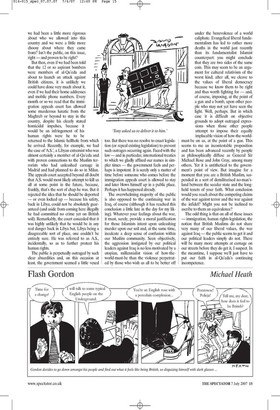The public know how these attacks happen — unlike the politicians
Rod Liddle says that the car-bomb plot was the predictable consequence of multiculturalism, lax immigration, mad human rights laws and neocon aggression. Shame the government can't see this Al-Qa'eda brain surgeons fail to blow up large car full of petrol' has an agreeable ring to it as a sort of taunt at our enemies and as a comfort blanket while we're standing in the mile-long queue at Heathrow with a sniffer-dog's snout in our groins. There is a certain truth to it, too — and one not yet remarked upon, in public at least, perhaps for superstitious reasons: they're pretty useless, aren't they? And have been for some time, now. Useless either with cool, state-of-the-art plastic explosives on the Underground, cunning toothpaste tube bomblets at the airport or, the new cruder approach — cars full of petrol to which they apparently forget to apply a cigarette lighter. Almost nothing they do works, usually as a result of their own incompetence and stupidity. Imagine you join al-Qa'eda, take your medical exams, get a job in a British provincial hospital and spend years patiently plotting, awaiting the right moment and painstakingly growing your beard. An enormous investment of time, money and effort. And then you fill the car full of gasoline and propane and succeed only in setting yourself alight and incurring a few parking fines. Suicide bombers are, by definition, an evolutionary anomaly, a strictly counter-Darwinian development. Maybe the good gene pool has already been blown to smithereens and only the thickoes remain. We may have been left with the jihadist equivalent of Norman Wisdom, squeaking 'Allah u-Akhbar, Mr Grimshaw!' shortly before being arrested near Sandbach.
Which I suppose is just as well, given our palpable confusion and double standards when faced with Islamist attacks on our soil. The perpetrators may not have been British born and bred (can anyone explain why this was seen as 'good news'?) and the car bomb itself a new, imported strategy — but everything else about the events of last weekend was same ol', same ol' — including the substance of the Prime Minister's response, even though he's a brand new Prime Minister.
We began with the usual and — this time — quite surreal assurances from politicians, Muslim leaders and, in particular the BBC, that the latest attacks were 'nothing to do with Islam'. This is what we always hear when a bomb has gone off, or failed to go off — and it is always a silly statement, based upon nothing more real than wishful thinking and a quick, thoughtless, unnecessary genuflection towards crowd control. On this occasion, though, it was subtly undermined by one of the perpetrators, doused in flames outside Glasgow airport, screaming 'Allah! Allah! Allah! Allah!' before being peremptorily battered by a passer-by. Also, they parked their car at a mosque — and yet, according to every bigwig, policeman and community leader interviewed, this was a mere case of coincidence — NCP being full at the time, presumably.
Then, as always happens, we had the next stage of wishful thinking. Led by the BBC's bizarrely pro-Islamist Frank Gardner, we were assured by assorted correspondents and politicians that Britain's Muslim community were, in their entirety, appalled and outraged by the attacks. Well, maybe they were — but how do you know? Did you ask 'em, Frank? Don't forget that more than half of our Muslims feel sympathy for suicide bombers in Israel and a fairly hefty minority (one in eight, at the last count) for similar action against the cockroach imperialist infidel scum (i.e. you and me) over here. Not to mention almost half of Britain's Muslims who want Sharia law in this country and do not remotely, therefore, share our norms and values.
We are told these sorts of things in order to stop us coming to unpalatable conclusions, because the government still clings, ever more precariously, to the vestigial tail of that discredited ideology, multiculturalism. Take, for example, the issue of immigration. The aspirant, useless bombers who missed their targets at Glasgow and London came here from Iraq, Jordan, Saudi Arabia, Pakistan. A recent Mori opinion poll commissioned by the government's Commission on Integration and Cohesion showed that almost 70 per cent of British people thought that we had let far too many immigrants into the country. This figure, incidentally, included almost half of all black and Asian British citizens polled. It was a remarkable poll not so much for its statistics, however, as for the strange response to those statistics. The establishment — the government, the BBC, the race charities and so on — professed themselves very worried and wondered what on earth should be done. A task force charged with dampening down trouble in the immigration hotspots, maybe? A few more lessons in English for the incomers and maybe fewer translators? But at no point did any of the powers that be suggest the one thing which an overwhelming majority of those polled wished for: an end to immigration. A moratorium. Or, at the least, an influx which was vastly reduced and better regulated.
This suggestion, implicitly supported by almost 70 per cent of those questioned and opposed by only ten per cent, was not even considered; it simply didn't figure on the radar. And you begin to understand why this might be when you remember that in 2003 the then Home Secretary David Blunkett insisted that he saw nothing at all wrong with unlimited immigration. And last year the director of enforcement and removals at Immigration and Nationality admitted that he hadn't `the faintest idea' how many illegal asylum seekers there were running around the country, getting up to mischief or otherwise. The government doesn't think that immigration matters; the public does. And the public's disaffection for mass immigration is not a reflexive racism and insularity, as the government and the BBC would seem to believe, but a worry based squarely upon the observable effects.
Would al-Qa'eda have found it so simple to place a dozen foot-soldiers in the NHS if we had been a little more rigorous about who we allowed into this country and we were a little more choosy about where they came from? Isn't the public, on this issue, right — and proven to be right?
But then, even if we had been told that the 12 or so aspirant bombers were members of al-Qa'eda and about to launch an attack against British citizens, it is unlikely we could have done very much about it, even if we had their home addresses and mobile phone numbers. Every month or so we read that the immigration appeals court has allowed some murderous lunatic from the Maghreb or beyond to stay in the country, despite his clearly stated homicidal impulses, because it would be an infringement of his human rights were he to be returned to the Islamic hellhole from which he arrived. Recently, for example, we had the case of A.S.', a Libyan extremist who was almost certainly a member of al-Qa'eda and with proven connections to the Muslim terrorists who had unleashed carnage in Madrid and had planned to do so in Milan. The appeals court accepted beyond all doubt that A.S. would most likely attempt to kill us all at some point in the future, because, frankly, that's the sort of chap he was. But it rejected the idea that he should be deported — or even locked up — because his safety, back in Libya, could not be absolutely guaranteed (and aside from coming here illegally he had committed no crime yet on British soil). Remarkably, the court conceded that it was highly unlikely that he would be in any real danger back in Libya but, Libya being a disagreeable sort of place, one couldn't be entirely sure. He was referred to as A.S., incidentally, so as to further protect his human rights.
The public is perpetually outraged by such clear absurdities and, on this occasion at least, the government seemed a little vexed too. But there was no resolve to enact legislation (or repeal existing legislation) to prevent such outrages occurring again. Faced with the law — and in particular, international treaties to which we gladly affixed our names in simpler times — the government feels and perhaps is impotent. It is surely only a matter of time before someone who comes before the immigration appeals court is allowed to stay and later blows himself up in a public place. Perhaps it has happened already.
The overwhelming majority of the public is also opposed to the continuing war in Iraq, of course (although it has reached this conclusion a little late in the day for my liking). Whatever your feelings about the war, it must, surely, provide a moral justification for those Islamists intent upon unleashing murder upon our soil and, at the same time, inculcate a deep sense of confusion within our Muslim community. Seen objectively, the aggression instigated by our political leaders against Iraq is no less motivated by a utopian, millennialist vision of how-theworld-must-be than the violence perpetrated by those who wish us all to be better off under the benevolence of a world caliphate. Evangelical liberal fundamentalism has led to rather more deaths in the world just recently than its fundamentalist Islamist counterpart: you might conclude that they are two sides of the same coin. This may seem to be an argument for cultural relativism of the worst kind; after all, we cleave to the values of liberal democracy because we know them to be right and thus worth fighting for — and, of course, imposing, at the point of a gun and a bomb, upon other people who may not yet have seen the light. Well, perhaps. But in which case it is difficult on objective grounds to adopt outraged expressions when those other people attempt to impose their equally implacable vision of how-the-worldmust-be on us, at the point of a gun. This seems to me an incontestable proposition and has been advanced recently by people as philosophically diffuse as General Sir Michael Rose and John Gray, among many others. Yet it is antithetical to the government's point of view. But imagine for a moment that you are a British Muslim, suspended in a sort of demilitarised no-man'sland between the secular state and the longheld tenets of your faith. What conclusion would you reach about the competing claims of the war against terror and the war against the infidel? Might you not be inclined to ascribe to them an equivalence?
The odd thing is that on all of these issues — immigration, human rights legislation, the notion that British Muslims do not share very many of our liberal values, the war against Iraq — the public seems to get it and our political leaders simply do not. There will be many more attempts at carnage on our streets before they do get it, I suspect. In the meantime, I suppose we'll just have to put our faith in al-Qa'eda's continuing incompetence.




















































 Previous page
Previous page